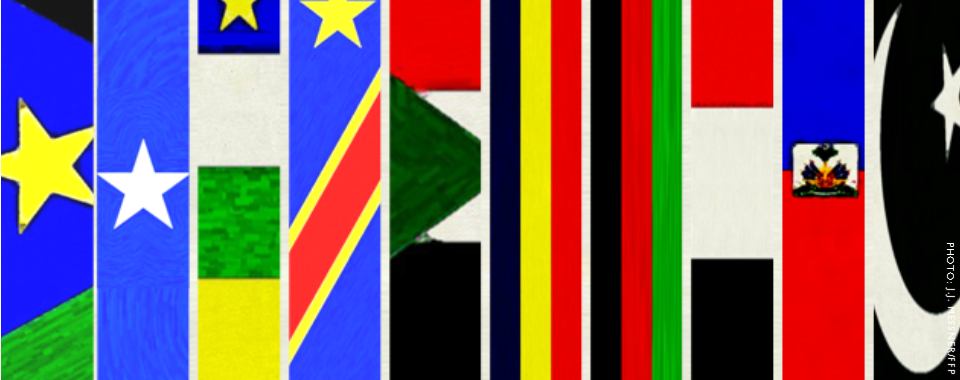BY KENDALL LAWRENCE
Identifying and exploring the fragility of states creates the opportunity to address how they might be able to combat pressures in the future. Learning what pressures states have been able (or unable) to reduce in the past year gives insight into the capacities that exist (or do not) within each state and their governments.
The top ten are profiled to give context to why they fall on this end of the Index and how they have changed since the previous year. Only two countries within the top ten saw a worsening in their individual scores, South Sudan and Central African Republic. Seven showed improvement and one experienced little change.
Though the top ten may seem like a dungeon from which there is no escape, with some countries seemingly doomed to inhabit the dubious list forever, the ten year trends of the Fragile States Index would demonstrate otherwise. Only three countries have been ranked in the top ten every year of the Index’s existence: Sudan, D.R. Congo, and Somalia. Two of the countries in the first-ever top ten, back in 2005, are now well on the path to recovery, as Sierra Leone has gone from 6th in 2005 to 35th in 2014, and Liberia has moved from 9th in 2005 to 24th now. The experience of Liberia and Sierra Leone should demonstrate that fragility and instability is not a life sentence. And although neither Liberia or Sierra Leone are threatening to break-in to the Sustainable category any decade soon, this just goes to reinforce the generational and gradual nature of development.
Similarly, climbing out of the top ten is only one metric. Take Zimbabwe — it is ranked 11th this year, and has featured in the top ten in eight of the previous ten years, even ranking as high as second-most fragile country in 2009. Though a year-by-year view of Zimbabwe may imply some level of hopelessness, long-term trends actually demonstrate that it is the 24th most improved country on the Index in the past decade. Its rank may not have improved much, but its score has. Its lack of ranking movement is perhaps more indicative of a ’traffic jam’ among similarly ranked countries than a lack of change.
Recovery and development is not linear. Some countries that leave the top ten may be back again. With the exception of the recently added South Sudan, every country in the top ten has improved year-on-year at some point. There is much to be concerned with in this current top ten. But there is always room — and capacity — for improvement.
South Sudan
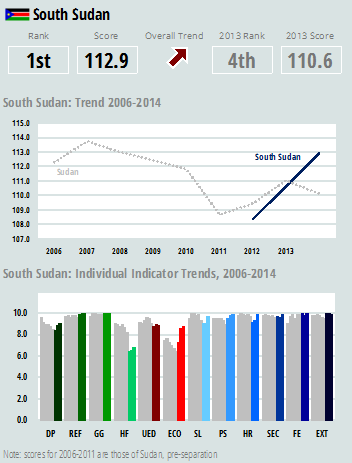 Despite the international aid directed at South Sudan since its independence, the fledgling country has succumbed to the pressures of the region and to its own lack of internal capacity. The success the international community expected from South Sudan did not fully take into account the time and capacity that it takes to build a successful state.
Despite the international aid directed at South Sudan since its independence, the fledgling country has succumbed to the pressures of the region and to its own lack of internal capacity. The success the international community expected from South Sudan did not fully take into account the time and capacity that it takes to build a successful state.
Ethnic tensions within the young country are manifesting in large-scale massacres and other gross human rights violations. Mounting internal pressures within the country’s ruling party and its military culminated in an outbreak of massive violence, largely along group lines, in December 2013, leaving thousands dead and tens of thousands seeking refuge in UN compounds across the country. State legitimacy had deteriorated significantly after President Salva Kiir dismissed the entire cabinet including Vice President Riek Machar in July. Earlier in the year, he had dismissed Finance Minister Kosti Manibe and Cabinet Affairs Minister Deng Alor allegedly over a multi-million dollar financial scandal and lifted their immunity from prosecution.
While oil flows resumed after a dispute over fees between South Sudan and Sudan had shut down production for more than a year, the economic situation in South Sudan remains dire. Taking the top spot on the Index for the first time, the country faces immense challenges with its fractured political structure and vast amounts of violence. It is unlikely that South Sudan will relinquish the top spot any time soon.
Somalia
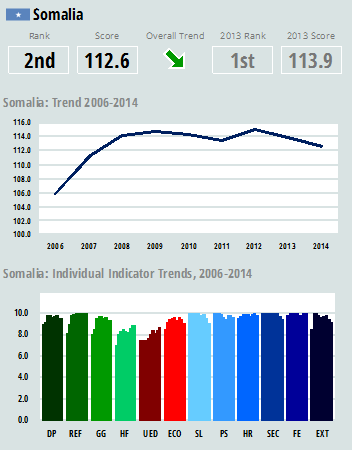 This year marks the first time since 2008 that Somalia has not appeared at the top of the Index as the most fragile state. It improved its score from last year, continuing an overall positive trend. In January 2013, the United States recognized the government of Somalia for the first time since 1991, setting the stage for the UN Security Council to partially lift the arms embargo in March. The progress of the new government was hampered in December by a falling out between the President and the Prime Minister, causing the Prime Minister to lose a confidence vote in parliament.
This year marks the first time since 2008 that Somalia has not appeared at the top of the Index as the most fragile state. It improved its score from last year, continuing an overall positive trend. In January 2013, the United States recognized the government of Somalia for the first time since 1991, setting the stage for the UN Security Council to partially lift the arms embargo in March. The progress of the new government was hampered in December by a falling out between the President and the Prime Minister, causing the Prime Minister to lose a confidence vote in parliament.
There has been a continued decrease in acts of piracy; however acts of terrorism by al-Shabaab increased from 2012. While al-Shabaab was forced to retreat from many of their strongholds in 2012, they increased activities and attacks in 2013 which triggered calls for increased UN troops, and an increase of 4,000 peacekeepers was authorized. The most notable attack by al-Shabaab did not happen within Somalia but was on the Westgate Mall in Nairobi, Kenya in retaliation for Kenya’s military presence in Somalia. The rise in attacks led the medical NGO, Doctors Without Borders, to shut down their operations within Somalia after 22 years due to the risk to their volunteers.
Areas of the country remain some of the most dangerous places in the world. Considering this, Somalia has made a huge amount of progress. As the first year in the past six that it has not been number one on the Index, it is possible and even probable that Somalia will continue to improve over the coming years.
Central African Republic
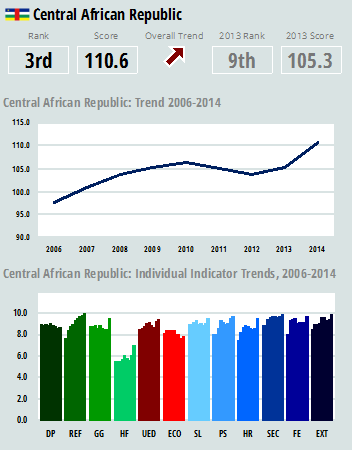 The CAR holds the distinction of the highest increase in its score over the past year, jumping from 9th to 3rd on the FSI, with each indicator across the board experiencing a worsening. The levels of religious violence across the country have caused over 200,000 internally displaced persons and have sparked warnings of genocide by the international community. Clashes between Christians and Muslims have continued despite the deployment of French troops.
The CAR holds the distinction of the highest increase in its score over the past year, jumping from 9th to 3rd on the FSI, with each indicator across the board experiencing a worsening. The levels of religious violence across the country have caused over 200,000 internally displaced persons and have sparked warnings of genocide by the international community. Clashes between Christians and Muslims have continued despite the deployment of French troops.
After an attempt at a power sharing agreement with President Bozize’s government in January 2013, Seleka rebels led by Michel Djotodia seized the capital in March. Djotodia proceeded to suspend the constitution and dissolve the parliament. After he was sworn in as president, he dissolved the Seleka coalition, although, many of the rebels have refused to disarm. Unable to control the fighters once under his command, turmoil and fighting have continued across CAR. Authorities in CAR issued an international arrest warrant for deposed President Bozize accusing him of crimes against humanity and incitement of genocide on May 31, 2013.
UN Chief Ban Ki-moon stated in August that the CAR has suffered a “total breakdown of law and order” and the majority of humanitarian organizations have fled the country. In April 2014, the UN Security Council approved deployment of UN peacekeepers to support the African Union troops already on the ground.
Democratic Republic of Congo
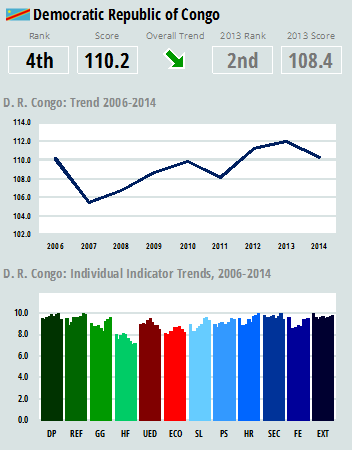 The Democratic Republic of Congo has reversed its upward trend on the Index this year and lowered its score for the first time since the 2011 FSI. While it appeared last year that the DRC might claim top of the Index, it has now dropped to the 4th spot. The largest improvement was in the security indicator. After the rampant violence that took place in 2012, this marked improvement in security is a surprising turn for the better.
The Democratic Republic of Congo has reversed its upward trend on the Index this year and lowered its score for the first time since the 2011 FSI. While it appeared last year that the DRC might claim top of the Index, it has now dropped to the 4th spot. The largest improvement was in the security indicator. After the rampant violence that took place in 2012, this marked improvement in security is a surprising turn for the better.
Following the ceasefire declared by the M23 rebels in February of 2013, warlord and alleged founder of M23, Bosco Ntaganda, surrendered to the U.S. in Rwanda. He was transferred to the International Criminal Court in The Hague to face prosecution. This was followed by an unprecedented UN Intervention Brigade of 3,000 to take action against rebels in the east of the country. This included the Democratic Forces for the Liberation for Rwanda. In December, the M23 rebels signed a peace deal with the DRC government.
While the general security situation has improved, human rights abuses continue. Also, a rebel group led by self-proclaimed prophet Paul Joseph Mukungubila attacked State Television Headquarters, the international airport and Congolese Army Headquarters in Kinshasa.
The country is moving in the right direction, but there is much left to be done before it can be claimed that it is out of the woods.
Sudan
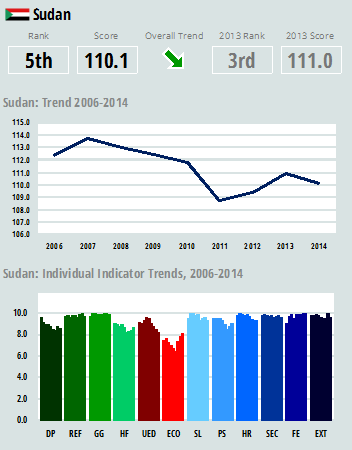 Sudan has reversed a 3-year negative trend on the Index. Much of the improvement can be attributed to the cessation of hostilities with South Sudan. In March 2013, Sudan and South Sudan reached an agreement to resume pumping oil, a shutdown that began in January 2012. This agreement included promises to withdraw troops from the border, creating a demilitarized zone.
Sudan has reversed a 3-year negative trend on the Index. Much of the improvement can be attributed to the cessation of hostilities with South Sudan. In March 2013, Sudan and South Sudan reached an agreement to resume pumping oil, a shutdown that began in January 2012. This agreement included promises to withdraw troops from the border, creating a demilitarized zone.
While conflict with South Sudan has stopped, the country continues to have widespread instability. There was continued violence in the south and in Darfur, including an attack on a UN peacekeeping team killing seven and wounding another 17 in July, the deadliest single assault on the international force within Sudan. Two more UN peacekeepers were killed in December. Violence also continues in Blue Nile state with increased fighting between government soldiers and rebels.
Large scale protests and demonstrations across the country over government cuts to fuel subsidies were met with violent crackdowns that killed scores in September. The harsh crackdown was accompanied by the closure of newspapers, continuing Khartoum’s negative legacy with freedom of the press.
Thirty members of the ruling National Congress Party announced plans to form a new party in October. This followed allegations of corruption and stagnation within the party leadership. President Bashir allegedly removed his first Vice-President and long-time ally Ali Osman Taha from his cabinet, though Bashir denied rifts in the government, claiming Taha had voluntarily resigned.
Chad
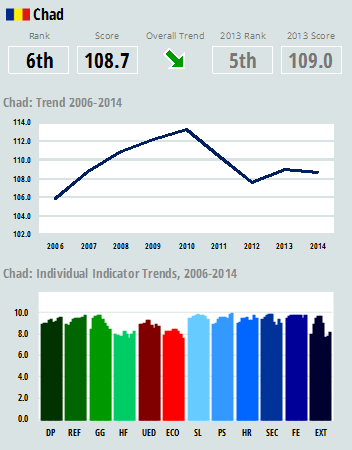 Chad has experienced little overall change in its total score on this year’s Index. It continues to face many of the same challenges it has faced over the past years with a staggering lack of resources. The country also suffers from an arid climate, an influx of refugees, and persistent violence.
Chad has experienced little overall change in its total score on this year’s Index. It continues to face many of the same challenges it has faced over the past years with a staggering lack of resources. The country also suffers from an arid climate, an influx of refugees, and persistent violence.
The impoverished country continues to receive significant numbers of refugees from its neighbors, including approximately 60,000 from Sudan fleeing the conflict in Darfur and 12,000 from the Central African Republic. Adding to the pressures on the state are the 150,000 Chadian citizens that returned to the country in 2013 after being expelled from Libya. Chad continues to receive this influx of people without significant improvements in infrastructure to support the additional population.
Chad has stepped up its military support sending troops out across the African continent. In January, they sent troops to assist France in driving al-Qaeda allies from northern Mali. It also pledged to send more troops to the Central African Republic following the coup that took place in March. It was also elected to the UN Security Council.
In May, political opposition and key military members were arrested after an alleged coup attempt. Former leader Hissene Habre was arrested in Senegal in July 2013 and faces charges for crimes against humanity, torture and war crimes by a special court set up by an agreement between Senegal and the African Union.
Afghanistan
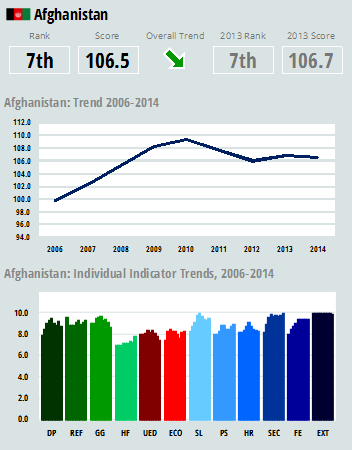 Despite significant investments by a variety of actors, both international and national, Afghanistan remains one of the least stable countries in the world. Corruption, drugs and extremism continue to run rampant across the country.
Despite significant investments by a variety of actors, both international and national, Afghanistan remains one of the least stable countries in the world. Corruption, drugs and extremism continue to run rampant across the country.
Command of all military and security operations was passed from NATO forces to the Afghan army in June of 2013. This has unfortunately not improved security within the country. While coalition causalities have decreased, Afghan military and civilian causalities have been on the rise. The UN has reported that the number of aid workers killed in Afghanistan more than tripled in 2013. The progress made on women’s rights, especially those of abused women seeking justice, has stalled. There was some movement towards justice as two former Kabul Bank chiefs were arrested in March for their alleged role in a multi-million dollar fraud that had nearly collapsed the banking system in 2010.
Afghanistan’s political scene remains rife with corruption and abuse. Sixteen of twenty presidential candidates for the upcoming 2014 election were unable to run due to their checkered pasts. Economic growth within the country has decreased by at least 10%, while a UN Study finds that Afghanistan’s opium cultivation and production have hit record levels. With about 1.6 million drug users, Afghanistan has one of the higher drug rates in the world. Planned talks between the Afghan government and the Taliban have created high levels of tension between Afghanistan and Pakistan.
Yemen
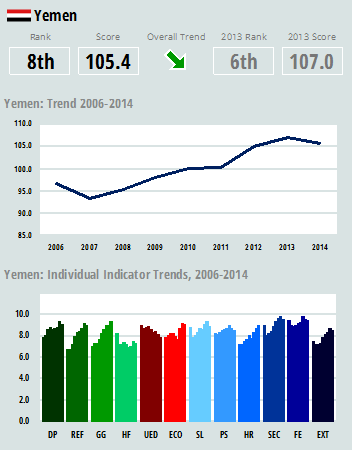 Yemen’s score on the FSI has improved for the first time since 2007. While the country still faces major challenges, it has made some progress. With the transitional government’s tenure coming to an end, there are serious questions about post-transition reform specifically regarding elections and how to handle the southern part of the country, where only some secessionist movements are calling for a complete secession. The economy has improved slightly under the transitional government, but international finance organizations are calling for further economic reforms.
Yemen’s score on the FSI has improved for the first time since 2007. While the country still faces major challenges, it has made some progress. With the transitional government’s tenure coming to an end, there are serious questions about post-transition reform specifically regarding elections and how to handle the southern part of the country, where only some secessionist movements are calling for a complete secession. The economy has improved slightly under the transitional government, but international finance organizations are calling for further economic reforms.
In March, a much delayed national dialogue began with the aim of drafting a new constitution. While the dialogue would not be completed until January 2014, Yemeni political parties signed a document pledging a solution to grant some autonomy to the once-independent South. Fighting in the Sana’a region between Shiite Houthi rebels and the Sunni Salafis caused at least 55 deaths in four days in October, raising serious questions about the security situation in Yemen. There continues to be a large number of refugees and IDPs especially in the northern part of the country. This has added pressure to an already dire humanitarian crisis with high levels of malnutrition and lack of access to water.
Al-Qaeda affiliates continued to operate within the country. The U.S. increased drone strikes against the terrorist organization, as the War on Terror continues to drive U.S. involvement in the region.
Haiti
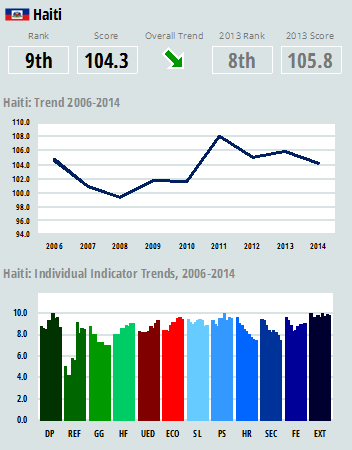 The 2010 earthquake had caused a large spike in Haiti’s score on the FSI 2011. This year, the country returned to a trend of improving in small increments following a slight setback last year. Despite the significant aid Haiti has received, the march towards progress has been slow and strenuous, and not always steady.
The 2010 earthquake had caused a large spike in Haiti’s score on the FSI 2011. This year, the country returned to a trend of improving in small increments following a slight setback last year. Despite the significant aid Haiti has received, the march towards progress has been slow and strenuous, and not always steady.
A cholera epidemic has been sweeping across Haiti since late 2010. It has been strongly linked to a sewage link at a UN camp housing peacekeepers from Nepal, who allegedly were infected with the Asian strain of cholera when they arrived in Haiti after the earthquake. The lawyers representing the victims of the epidemic have filed a lawsuit against the UN demanding compensation. The UN has claimed legal immunity from these claims.
Protests in November targeted President Martelly and his failure to hold local and legislative elections as well as the high cost of living and high levels of corruption within the nation. Protesters called for his resignation. In December, President Martelly took a step forward by agreeing to publish a new electoral law. He also gave up a plan to dismiss members of the Senate.
The country took a step towards justice as the former dictator Jean-Claude Duvalier, known as Baby Doc, appeared in court for the first time in February to answer questions on his 15-year tenure as leader. Whatever the outcome of proceedings, the precedent of forcing former political leaders to answer for their actions is a positive step forward.
Pakistan
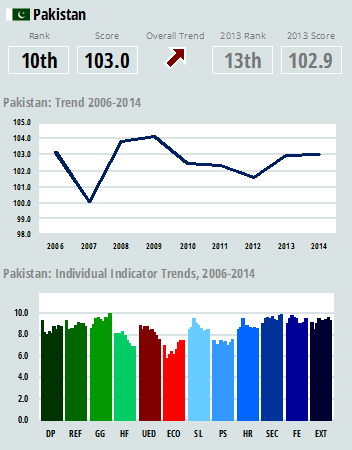 Taking the last spot in the Top Ten this year, Pakistan has moved up the list not because of the worsening of its own score, but the improvement of others around it. Located in one of the most volatile regions of the world, Pakistan has immense internal and external pressures.
Taking the last spot in the Top Ten this year, Pakistan has moved up the list not because of the worsening of its own score, but the improvement of others around it. Located in one of the most volatile regions of the world, Pakistan has immense internal and external pressures.
In January, Prime Minister Raja Pervez Ashraf was arrested over corruption allegations dating back to 2010 and his time as a minister. Following his arrest and a large-scale protest led by cleric and anti-corruption campaigner Tahirul Qadri, the government agreed to dissolve parliament early and appointed a caretaker government to oversee elections.
Nawax Sharif of the Muslim League-N was appointed Prime Minister in elections held in May, which had the largest voter turnout since 1970 despite attacks and intimidation carried out by the Taliban.
There were a large number of bomb attacks over the year including the deadliest attack on Christians in Pakistan’s history. In September, more than 80 people were killed in a double suicide bombing set off at a church in Peshawar. Taliban-linked Islamists claimed responsibility.
